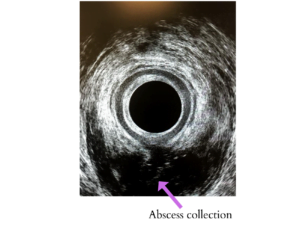ANAL ABSCESS SURGERY IN SINGAPORE

Reliable Treatment for Anal Pain in Singapore
At our Crest Surgical Practice, we provide reliable treatment for anal pain in Singapore to help you find relief. Anal pain can occur due to various factors, including anal abscesses or fissures. It can lead to discomfort and swelling and create difficulty in daily activities such as sitting and walking. You must seek prompt medical attention to identify and address the root cause of your anal pain.
Our Approach to Treatment
- We evaluate your condition to determine the cause of your anal pain.
- Each patient is unique, as our treatment plans. We tailor treatment plans like anal abscess surgery to ensure you get appropriate care.
- You can trust our experienced surgeon and qualified team to get treatment for anal pain in Singapore.
Why Undergo Anal Abscess Surgery in Singapore?
Treating anal pain or perianal abscess with antibiotics would not ensure complete relief. If you want to treat the anal abscess, surgery is an effective procedure. It treats and heals the anal abscess and prevents recurrence.
Opting for anal abscess surgery in Singapore at Crest Surgical Practice ensures expert treatment by an experienced surgeon. The surgical treatment aims to drain the pus and give pain relief to the patient.
Our compassionate approach and personalized care plans prioritize your well-being. We ensure you get reliable and effective care and treatment for your anal abscess surgery, helping you regain comfort and improve your quality of life.
Information About Perianal Abscess
What is perianal abscess?
A perianal abscess is a painful and swollen collection of pus that forms around the anus due to an infection in the tissue. The infection typically arises from a blocked or infected anal gland, which can cause inflammation, swelling, and tenderness in the area.
What are the symptoms?
The symptoms of a perianal abscess can include:
- Pain around the anus, which can be severe and throbbing.
- Swelling and redness in the skin around the anus.
- Tenderness and warmth around the affected area.
- Fever and chills.
- Difficulty sitting, walking or passing stool due to pain and discomfort.
- Pus or discharge from the abscess.
- A lump or firm mass near the anus.
How to treat perianal abscess?
In some cases, early or small perianal abscesses can be treated with oral antibiotics. However, close monitoring is necessary to ensure that the abscess is responding to the medication. If symptoms do not improve within a few days or if the abscess grows larger, surgical intervention may be required.
Surgical drainage of the abscess is typically necessary if the abscess is large or if medical therapy fails. This procedure is usually done under general anesthesia or sedation and is considered a minor surgery. It can be performed as a day surgery, and involves making a small incision to drain the pus and promote healing.
What are the risks of perianal abscess surgery?
Some potential risks and complications may include:
Bleeding: There is a risk of bleeding during and after surgery, especially if the abscess is large.
Pain and discomfort: You may experience pain and discomfort after surgery, which can be managed with pain relief medications and sitz baths.
Recurrence: In some cases, the abscess may recur after surgery, requiring further treatment.
Damage to surrounding tissue: Surgery to drain a perianal abscess can sometimes (rare) damage surrounding tissue or muscles, causing possible anal incontinence.
What is the association between anal fistula and perianal abscess?
Perianal abscesses can sometimes be the primary presentation of an anal fistula. If an anal fistula is discovered during a perianal abscess drainage procedure, the treatment plan will depend on the complexity of the fistula.
For short fistulas, a fistulotomy may be performed to lay open the fistula tract and allow it to heal from the inside out. For more complex fistulas, a seton may be inserted to help control the infection and prevent damage to the anal sphincter during surgery.
In some cases, the anal fistula may not be obvious during the initial perianal abscess surgery and may only become apparent a few weeks later. In this situation, an elective surgery to treat the anal fistula may be scheduled for a later date.

Other Colorectal Surgery
Consult Us

Dr LEE Kuok Chung
Senior Consultant General Surgeon
Subspeciality interest: Colorectal, Advanced Endoscopy and Robotic Surgery

Dr TAN Wee Boon
Senior Consultant General Surgeon
Subspeciality interest: Thyroid, Hernia and Endocrine Surgery

Dr KIM Guowei
Senior Consultant General Surgeon
Subspeciality interest: Upper Gastrointestinal, Bariatric and Robotic Surgery
Crest Surgical Practice
Healing Hands, Compassionate Hearts: Your Partner in Surgical Care

